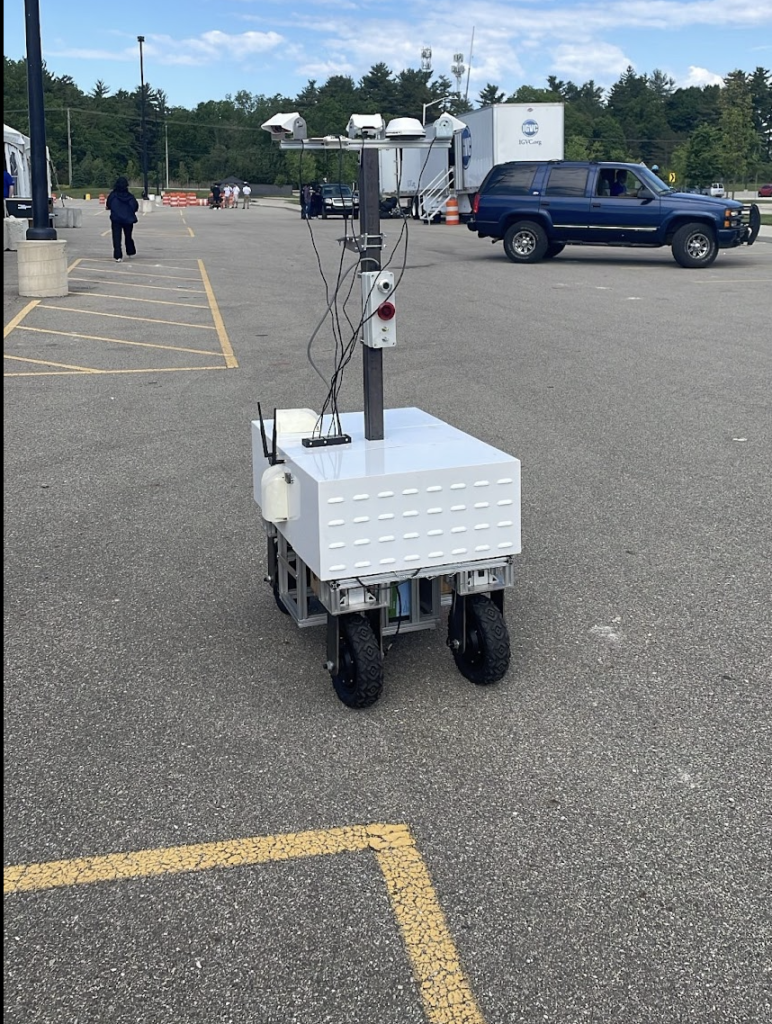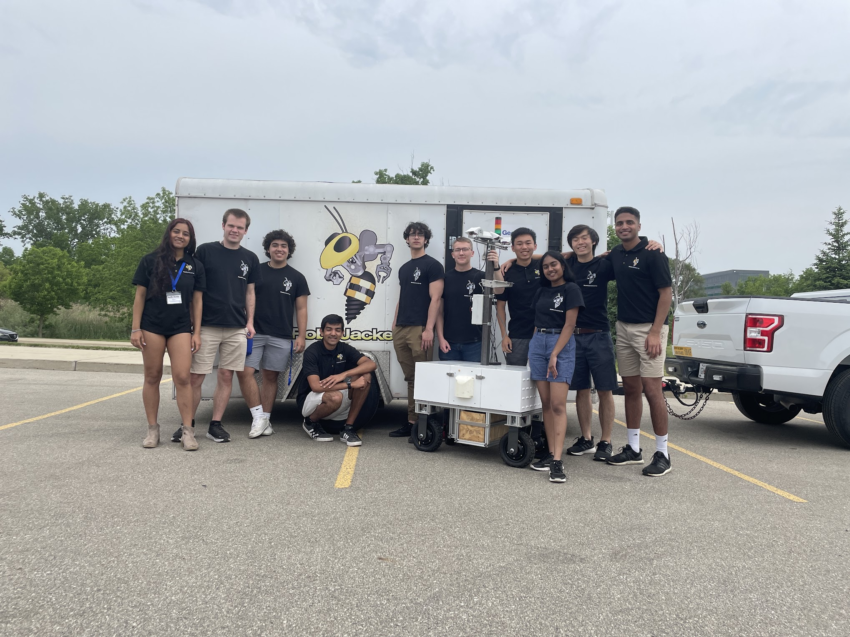
The 29th annual Intelligent Ground Vehicle Competition (IGVC) was held this past June in Rochester, Michigan. This competition will be a familiar classic to our alumni; RoboJackets has been in attendance every year since 2003, with the only breaks being in 2005 and 2020 due to a lack of manpower and the COVID-19 pandemic, respectively. However, this year’s IGVC marked a bittersweet end to this succession, as the RoboNav team had decided that this would be their last time in attendance. Instead, efforts will pivot towards the University Rover Competition (URC). With that in mind, the team went into this year’s IGVC ready to make some memories and put Swervi to the test.
IGVC consists of two distinct parts: the autonav challenge and the design competition. The autonav challenge is the robotics test of IGVC, with teams’ autonomous vehicles competing to complete (or get as far as possible through) a course consisting of barrels, painted white lines, and ramps or other miscellaneous obstacles. The design competition gauges team-specific innovations and improvements through a presentation and question-and-answer session with the judges.

Caption: Swervi ready for battle at IGVC 2022
For this year’s competition, the new swerve drive robot Swervi was finally up to bat. The ideation and mechanical design of Swervi started in 2019-2020 when Jessiii was completed; however, the robot had an extended development time due to the cancellation of the 2020 IGVC. Aptly-named Swervi’s swerve drive design was a step outside the box for RoboNav, since nearly all previous robots built for IGVC had differential drivetrains. It also marked a turning point in the team, as RoboNav had found success with Jessi and its iterations over the past four years. Stepping into brand-new territory presented a great learning opportunity but also resulted in brand-new challenges.
In the lead up to IGVC, the electrical team was still working on firmware for swerve drive motor control. In contrast to Jessiii, which only had two DC motors to control via one motor controller, Swervi had four DC and four stepper motors which required more controllers and different types of controllers. Due to this added complexity, Swervi arrived at competition essentially paralyzed. The team was working on debugging and improving the control during the competition by using stepper motors with individual controllers; however, the mbed microcontrollers were eventually burnt out and broken. This resulted in the team failing to qualify for the autonav challenge, which was a big disappointment after working so hard on Swervi over the past year. Charles Li, the 2021-2022 project manager of RoboNav, said he felt it was a letdown for past members, especially during the team’s final IGVC. “I thought about the other components of Swervi, how long ago [the] design started, and how many people worked on it.…I couldn’t help but feel a bit disappointed that their efforts couldn’t amount to what we wanted it to amount to.”
Caption: The team works on Swervi at competition
However, all was not lost. The team still presented the completed Swervi design to the judges and placed 3rd in the design competition. Additionally, the team bonded and grew closer by facing the ups and downs of competition over 4 days. Priyanka Rajan, the upcoming project manager, stated she was surprised by how much she was able to get to know her teammates over the course of IGVC. Despite the disappointment in the autonav challenge this year, the future looks bright for RoboNav.
The team leads present the Swervi design to the judges

RoboNav receives the design award for placing 3rd.

RoboNav bond at the apple cider mill after a hard day at work
Speaking of the future, next year RoboNav will take one small step for RoboJackets, one giant leap for robot-kind. The team will fully focus their energy on URC after spending the last two years researching and prototyping in preparation for the new competition. There is still much to do, including the establishment of and recruitment for a new Science subteam to tackle the astrobiology aspect of the competition. Nostalgic alumni may be disappointed that the team is setting aside IGVC after all this time, but do not fret. Electrical lead Andrew Roach said it well: “We’re moving on from IGVC but we’re not forgetting about our past experiences… We’re trying to build on and learn from [what we worked on in the past few years for IGVC].”
So, after bonding and commiserating over all the good and the bad of IGVC 2022, RoboNav is moving together towards a brand new challenge to continue learning about and advancing in the field of robotics.

